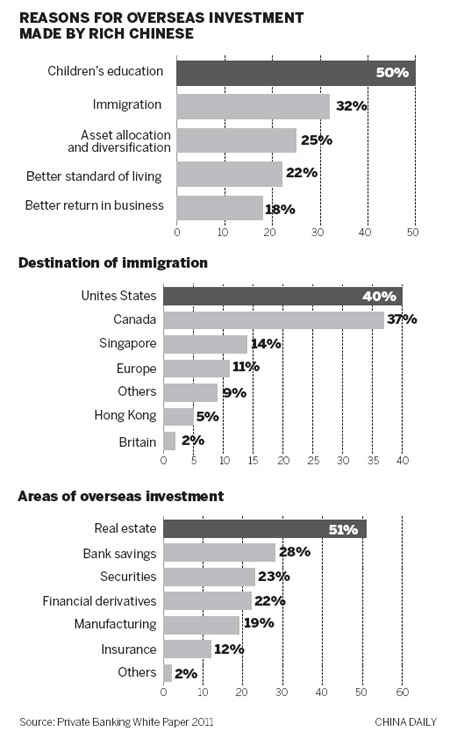Chinese rich are keen to emigrate
Source: China Daily
SHANGHAI – About 60 percent of the rich Chinese people, each of whom has a net asset of at least 60 million yuan ($9.44 million), said they intended to migrate from China, a report has found.
About 14 percent of them have either already migrated from China or have applied for migration.
The three most favored destinations by the Chinese rich are the United States, Canada and Singapore. The US is the first choice of some 40 percent of the people interviewed, according to a white paper jointly released by Hurun Report and the Bank of China (BOC) on Saturday.
According to US Citizenship and Immigration Services (USCIS), the number of Chinese applicants for investment immigration has exceeded applications from any other country or region.
Last year, the USCIS issued 772 EB-5 visas, meant for investor immigrants, to Chinese people. They account for 41 percent of the total EB-5 visas issued by the agency.

“Among all the destinations in terms of investment immigration, the US always outstand all other options as the country does not impose any quota,” said Jiao Lingyan, a client executive of the investment immigration department of the Beijing-based GlobeImmi International Education Consultation Co.
“The minimum amount required for investment immigration to the US is $500,000. But it should be noted that this applies to investments in projects recommended by authorities in the US. People considering these projects should take into account that they may not make profits,” Jiao said.
“It is worth noting that the minimum amount for investment immigration will be raised in the coming years, because the number of rich people in China is rapidly growing,” she said.
Among the 980 people interviewed by Hurun Report and the BOC, one-third said they have assets overseas, which on an average account for 19 percent of their total assets.
While 32 percent of the interviewees said they have invested overseas with a view to immigrate, half of them said they did so mainly for the sake of their children’s education.
Zhang Yuehui, a Beijing-based immigration expert, said children’s education is also the top concern among those who want to immigrate.
“A growing number of parents in China have realized that children growing up in the examination-oriented education system in China will find it hard to compete in an increasingly globalized world,” Zhang said.
Wang Lilan, 38, a mother of two who immigrated to Australia from her home province of Fujian two years ago, was one of those parents.
“My 12-year-old elder daughter used to do her homework very late into the night. But here in Australia, she does quite a lot practical assignment, in a playful way. And she has more spare time to do the things she likes,” Wang said.
“I feel very delighted to see my children having fun while studying,” Wang said.
Chinese immigrants are also getting younger, with the largest group aged between 25 and 30, compared to the 40-45 age group in the past, Zhang said.
SHANGHAI – Having decided to move to Los Angeles with her husband, expecting mother, Xu Cong, 25, has been busy preparing the immigration documents and plans to leave for the United States in December.
“I’ve discussed our future with my husband and we reached the conclusion that if we want to provide better education to our children and have more career choices for ourselves, immigration is the best solution,” said Xu who studied in Britain for five years from 2003 to 2008.
They come under a category different from investment immigration, where applicants have to invest at least $500,000 in a targeted employment area to get a visa. Xu and her husband said they chose to register their own trading company by putting at least $800,000 as the starting fund.
According to the US Citizenship and Immigration Services, targeted employment area refers to a high-unemployment or rural area in the US. The minimum qualifying investment in such cases is $500,000.
Xu’s company will import gloves from China to the US and export water purifier and medical devices from the US to other countries.
In accordance with the rules set by the US Citizenship and Immigration Services, Xu also needs to create or preserve at least 10 full-time jobs for qualifying US workers within two years.
“The whole process of preparation is more complicated than we thought, especially we have to write the detailed business plans for the company on how to make enough profits,” she said.
Xu and her husband decided to move their date of arrival in the US forward, from March next year to December this year, to make sure that their baby will be born in the US.
“My children will receive better education and we will work for our company in the US Our parents will also be able to move to the US and live with us,” said Xu.
